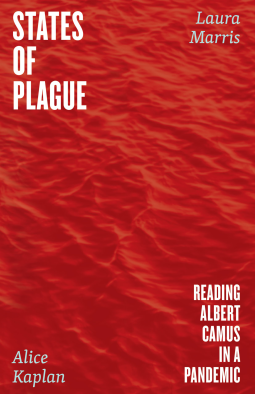
States of Plague
Reading Albert Camus in a Pandemic
by Alice Kaplan; Laura Marris
This title was previously available on NetGalley and is now archived.
Send NetGalley books directly to your Kindle or Kindle app
1
To read on a Kindle or Kindle app, please add kindle@netgalley.com as an approved email address to receive files in your Amazon account. Click here for step-by-step instructions.
2
Also find your Kindle email address within your Amazon account, and enter it here.
Pub Date Oct 31 2022 | Archive Date Oct 01 2022
Talking about this book? Use #StatesofPlague #NetGalley. More hashtag tips!
Description
As one of the most discussed books of the COVID-19 crisis, Albert Camus’s classic novel The Plague has become a new kind of literary touchstone. Surrounded by terror and uncertainty, often separated from loved ones or unable to travel, readers sought answers within the pages of Camus’s 1947 tale about an Algerian city gripped by an epidemic. Many found in it a story about their own lives—a book to shed light on a global health crisis.
In thirteen linked chapters told in alternating voices, Alice Kaplan and Laura Marris hold the past and present of The Plague in conversation, discovering how the novel has reached people in their current moment. Kaplan’s chapters explore the book’s tangled and vivid history, while Marris’s are drawn to the ecology of landscape and language. Through these pages, they find that their sense of Camus evolves under the force of a new reality, alongside the pressures of illness, recovery, concern, and care in their own lives. Along the way, Kaplan and Marris examine how the novel’s original allegory might resonate with a new generation of readers who have experienced a global pandemic. They describe how they learned to contemplate the skies of a plague spring, to examine the body politic and the politics of immunity.
Both personal and eloquently written, States of Plague uncovers for us the mysterious way a novel can imagine the world during a crisis and draw back the veil on other possible futures.
Advance Praise
“I thought I knew both The Plague and what it brings to the story of our own plague experience. After reading Kaplan and Marris’s States of Plague, I realize I could not have been more mistaken. This is a brilliant book that is always eloquent, often insightful, and, at times, simply heartbreaking.”—Robert Zaretsky, author of Victories Never Last: Reading and Caregiving in a Time of Plague
“Turning the intensity of a lockdown gaze on The Plague, Kaplan and Marris restore to Camus's constrained and unsettling allegory a world of associations, from occupied Paris in World War II to crumbling colonial cemeteries in Algiers. These erudite but highly personal reflections spiral outward from careful readings of the novel, relieving the mind like the ventilation of a long-closed room.”—Emily Ogden, author of On Not Knowing: How to Love and Other Essays
“In States of Plague, Kaplan and Marris combine their thought-provoking personal impressions with brilliant critical analyses based on the novel’s wealth of cultural, historical, and political contexts. Their complementary readings function both as a helpful introduction to The Plague and eye-opening observations about the novel’s contemporary relevance.”—Raymond Gay-Crosier, emeritus, University of Florida
Available Editions
| EDITION | Other Format |
| ISBN | 9780226815534 |
| PRICE | $20.00 (USD) |
| PAGES | 152 |
Featured Reviews
 Mandy J, Reviewer
Mandy J, Reviewer
The recent Covid pandemic resulted in renewed interest in Albert Camus’ novel The Plague and many read it or re-read it and afterwards discussed its relevance to our contemporary world, eager to discover whether it could illuminate our current predicament. Certainly I re-read it and found it resonated strongly with me. Alice Kaplan and Laura Marris have written individual responses to the novel and in alternating chapters offer short essays on the book’s history, significance and relevance. A combination of literary criticism and analysis, sociology, history and personal experience, the book is a thoughtful, insightful and interesting exploration of Camus’ writing and I very much enjoyed it. Recommended for literary scholars and lay-readers alike; there’s something for everyone here.
 Reviewer 1008421
Reviewer 1008421
I absolutely loved reading this book. It was a balm during some complicated times--not just the pandemic, but the ways in which we think about and value literature as we come up against confrontations in education and the humanities. I could read this book again and again and would love to read more like it, contextualizing our lives and spirits in the framework of literature. This one I'm going to buy for my personal library.


















